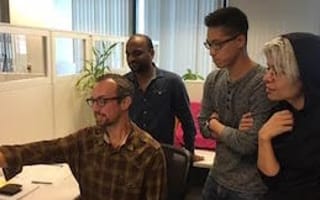
William Parducci, CTO at El Segundo-based Ace Metrix, has seen a lot in his 20-plus year career in tech. Currently, he's developing a platform that helps businesses access television analytics in a cost-effective manner, while adding different functionalities to keep the product an industry leader.
Having worked in Silicon Valley and Silicon Beach, Parducci is keenly aware of the differences in the two communities' respective approaches to how employees are treated. LA, he said, has created a community where engineers are more focused on a work-life balance than their counterparts in the Bay Area.
What are the biggest tech projects your team is working on this year?
Natural Language Processing is becoming accessible to companies without multi-million dollar R&D budgets thanks to continued growth in open source software tools. This is very timely for us as we are continuously trying to extract more information from our collected data. In particular, we are currently working on semantic mapping of our open-ended responses. It’s a bit tricky in our space, because of the wide variety of response types, but we think that we are close to being able to identify some key emotional markers. The beauty of this type of exploration is that it builds upon itself; pretty much everything we learn can be used to learn more. True, there is a very long way to go, but I think the tech industry as a whole is starting up the 'hockey stick' curve of knowledge in this space.
 What are the biggest technological hurdles your team has faced, and how did you overcome them?
What are the biggest technological hurdles your team has faced, and how did you overcome them?
Do more with less…faster. It’s the nature of a start-up to try to live up to the potential of an idea. In practical terms it is an impossible task, you simply cannot make things as fast as someone can envision them. Even lavishly-funded startups face this dilemma. Our solution to it has been to prioritize functionality, deliver something quickly, then delivery something better once we have real-world feedback. When we approach a new project we classify things as “.0” and “.x”. The former is what will get shipped in the initial release, while the latter is something we think will be valuable, but will be addressed in subsequent releases once we have validation and operational feedback on the first attempt.
The idea is simple, but to do it right requires a lot of discipline by both engineering and product teams to determine where that line is drawn. Hint: If someone isn’t unhappy, either the scope is wrong or the timing estimates are off (in which case everyone will be unhappy when delivery doesn’t meet expectations).
What are some lessons you've learned about working in LA that other local entrepreneurs can learn from?
Having managed engineering teams in LA and Silicon Valley, my observation is that developers in LA tend to put more emphasis on quality of life than their Northern counterparts. This is not to say they don’t work as hard, but that balancing work and home time tends to play a large role in overall satisfaction. For example, commute time is a big factor for many people in LA. Having flexible office hours to allow employees to avoid wasting hours a day in their car has worked well for us. Everyone is in the office in the middle of the day so that we can grab a whiteboard when necessary, but otherwise the hours fit the person. I know that some of the mega-techs are trying to bring the Silicon Valley “live/work/play” culture to LA and I am very interested to see how that plays out.
What do you look for when hiring employees?
First and foremost I look for a genuine interest in developing software, a fascination with technology. People with passion find a way to succeed and are generally more creative. It’s pretty straightforward to transfer technical knowledge if the prospect has demonstrated basic technical skills in a team environment. Sure, the contribution curve ramps up more slowly, but in my experience the return on taking the time to train someone with passion pays off many time through the arc of their tenure at the company.
Image via Ace Metrix



